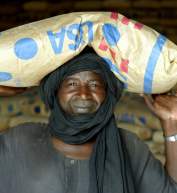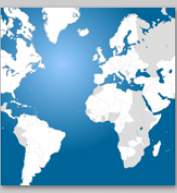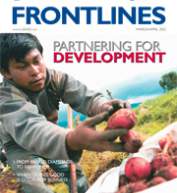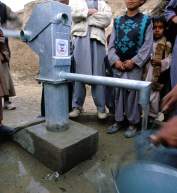Congressional Testimony
Good afternoon Chairman Smith, Ranking Member Bass, and members of the Subcommittee. Thank you for inviting me to speak today. It is an honor for me to appear before this Subcommittee to discuss such a critical issue. Nigeria is among the United States' most strategic African partners. Home to the seventh largest population in the world, Nigeria is the world's largest contributor to peacekeeping missions in Africa, the fifth largest supplier of U.S. crude oil imports, Africa's second largest economy, and home to the continent's largest Muslim population. Nigeria plays a significant role in African regional affairs through the African Union, the Economic Community of West African States, and counterterrorism and transnational crime efforts.
Since 2003, Nigeria has been carrying out an ambitious agenda of reforms in public finance, agriculture, banking, the electoral process, oil and gas, power, telecommunications, ports, steel, and mining. On May 29, 2011, President Goodluck Jonathan and 26 state governors were sworn in for four year terms after elections that were freer and less violent than any since Nigeria's return to democracy in 1999. The government's strong economic management team is playing a crucial role in carrying out sound macroeconomic policies and strengthening trade and investment to sustain the growth that will be needed to create jobs.
Mali is facing a complex emergency: a political crisis, a major drought, and threats to internal and regional security. These interrelated crises call for a careful and considered development response. According to the World Bank, countries that have become characterized as fragile states require 20 to 25 years to recover, at great cost to their own people as well as to the international community in terms of resources diverted to stabilize and get those states back on the track of effective, transparent governance. While Mali is not currently a fragile state, it is in a fragile situation.
Our goal is a stable, self-reliant, unified Iraq. This is critical to U.S. interests in the Middle East. It is a goal made possible through enormous sacrifice by Americans and Iraqis alike. USAID is adjusting its footprint in Iraq in line with its development strategy and programmatic needs. We are focused on Iraq's sustainable development under the terms of the U.S.- Iraq Strategic Framework Agreement. Over the past ten years, USAID's role in Iraq progressed through three distinct stages:
-
Immediately after the invasion, USAID's emphasis was on restoring essential infrastructure and services and supporting transitional democratic processes.
-
Then, as part of the military and civilian counterinsurgency campaign, we concentrated on stabilizing Iraqi communities, and strengthening government institutions.
-
Now, with the completion of the transition to civilian leadership of the U.S. effort in Iraq, USAID's focus is on helping Iraqis improve how they manage their own resources for development.
Sub-Saharan Africa is one of the fastest growing regions in the world. In 2011, it was home to six of the world's 10 fastest growing economies. Foreign direct investment is approaching $80 billion a year, and trade has tripled over the last decade. Consumer spending is set to rise 80 percent by 2020 and Africa now has a fast-growing middle class, expected to increase from 60 million to 100 million people by 2015. The continent's fortune is not the outcome of good luck. It is the result of years of hard work and better macroeconomic management; improved economic and political governance; a reduction in armed conflicts; increasing foreign capital inflows, particularly direct investment; and improvements in the business climate.
The Lord’s Resistance Army (LRA) remains amongst the most persistent perpetrators of human rights violations in the world. As recently as last month, a UN report found that the LRA continues to commit all six grave violations against children identified by the UN Security Council as war crimes.
Chairman Rohrabacher, Ranking Member Carnahan, and distinguished members of the Subcommittee, thank you for the opportunity to appear before you today. My name is Larry Sampler and I am the Senior Deputy Assistant to the Administrator & Deputy Director of the Office of Afghanistan & Pakistan Affairs at the United States Agency for International Development (USAID). I am glad to be here to discuss USAID’s work in Afghanistan and the various methods we are employing to ensure rigorous, multi-layered oversight of U.S.
Thank you, I welcome the opportunity to participate in today’s hearing, which is shining a spotlight on the disturbing trend toward growing restrictions on the space for civil society institution in a number of countries and the physical threats against citizens stepping forward to demand change in their societies.
Chairman Smith, Ranking Member Bass, Members of the Committee, I appreciate your giving me the opportunity to speak before you today on the deepening humanitarian crises in Sudan and South Sudan.
Good morning Chairman Coons, Ranking Member Isakson, and members of the Subcommittee. Thank you for inviting me to speak with you today.
The more than 9,000 men and women of USAID work to provide effective economic, development, and humanitarian assistance in support of our U.S. foreign policy goals. How we improve our contracting practices, including our contingency contracting practices, directly impacts the success and sustainability of our mission. Accountability to Congress and the U.S. taxpayer for the funds we use to develop successful programs is our duty. And it is a duty that we take very seriously.
Therefore, USAID understands the significance and motivations behind this legislation. It addresses many of the management challenges that were highlighted in the report written by the Commission on Wartime Contracting (CWC), that you, Senator McCaskill, created along with Senator Webb. It also addresses some of the most important issues that we contend with through engagements such as Afghanistan, Iraq, and expect to contend with in a potential future contingency.
Madam Chairwoman, Ranking Member Lowey, and Members of the Committee: Thank you for the invitation to testify today. I am grateful for the committee’s interest in the U.S. Agency for International Development’s (USAID) priorities in Latin America and the Caribbean and pleased to have this opportunity to discuss the Obama Administration’s development policy in the Americas and our efforts to enhance security in the region. As always, I am eager to hear your advice and counsel.
Pages
Last updated: October 17, 2012








Comment
Make a general inquiry or suggest an improvement.